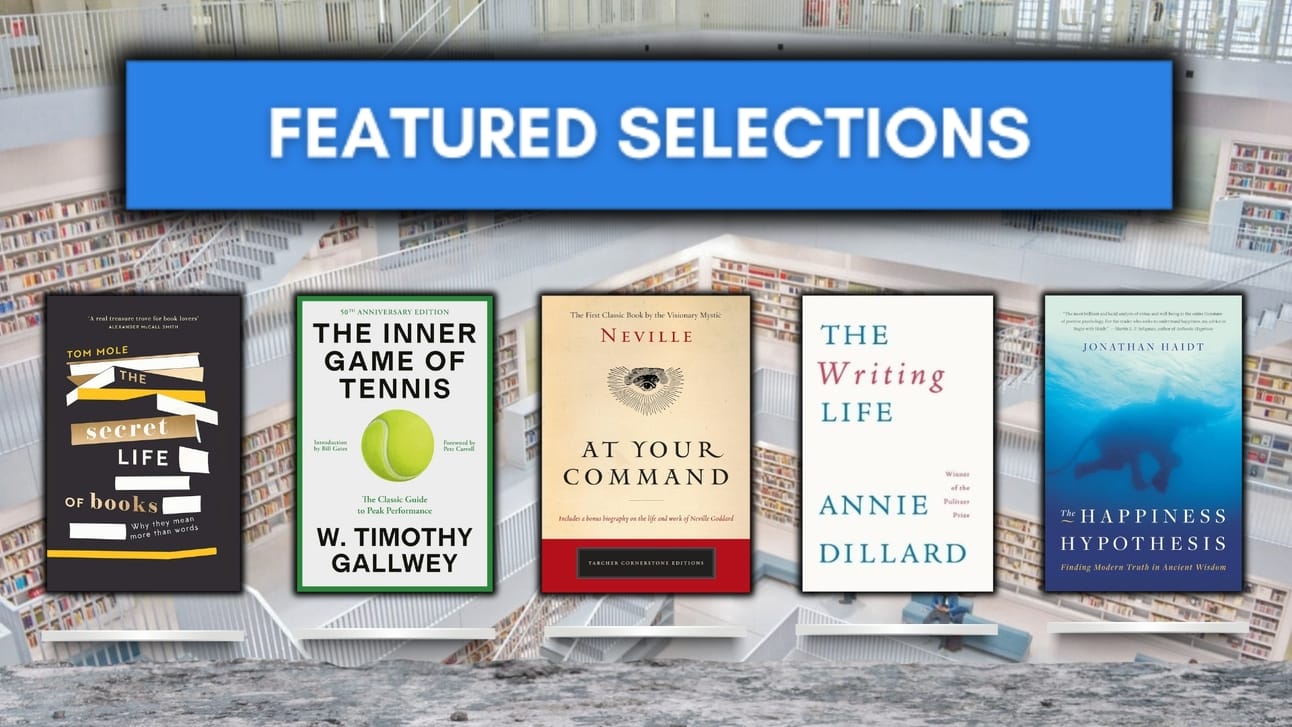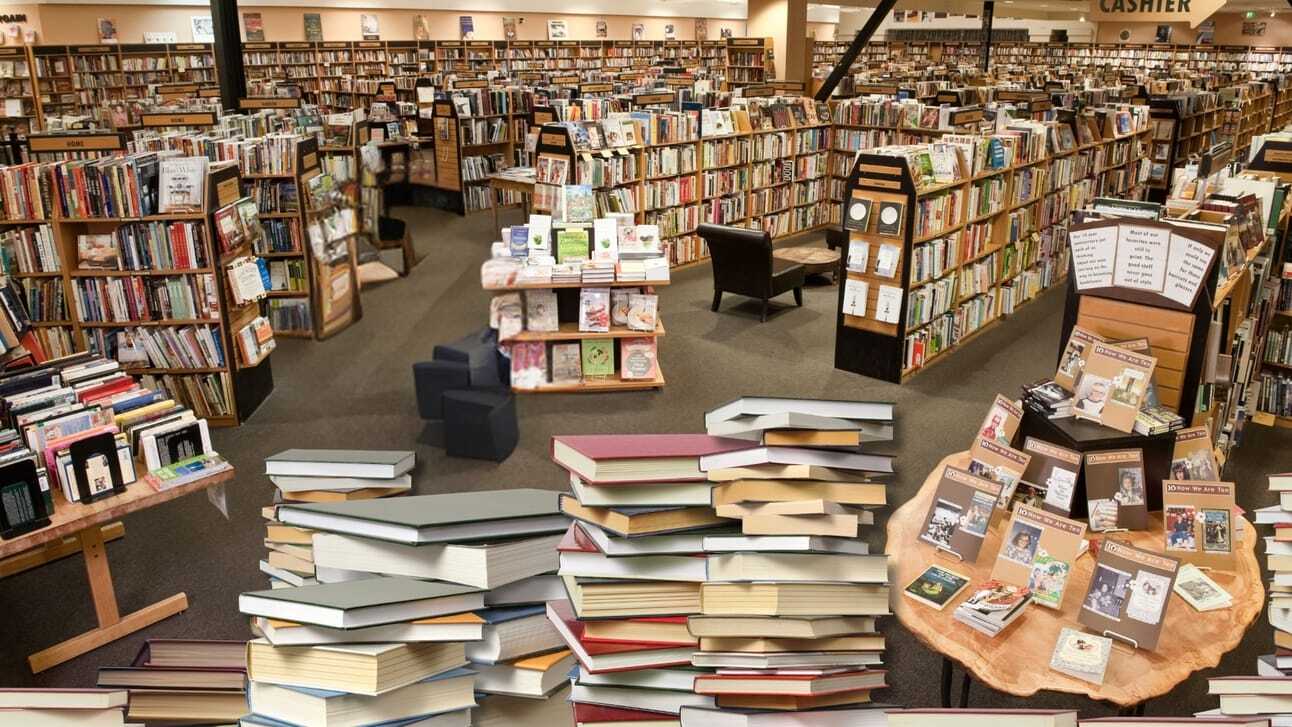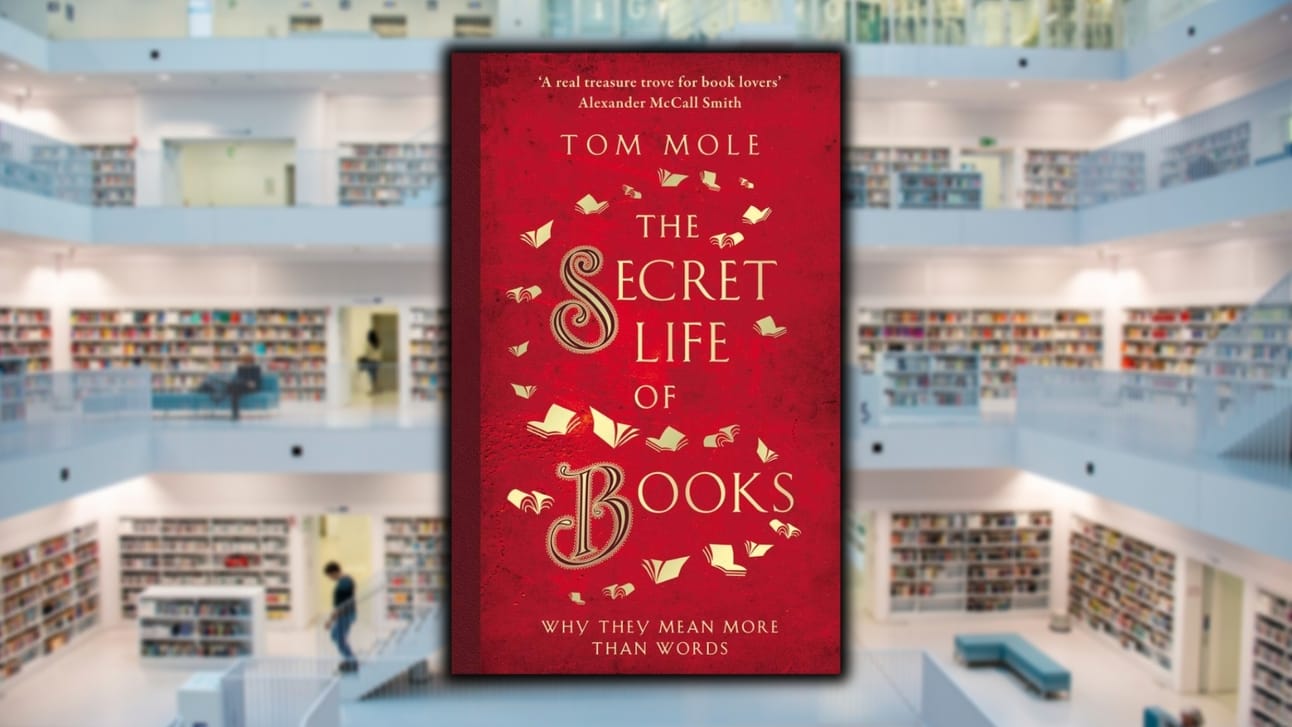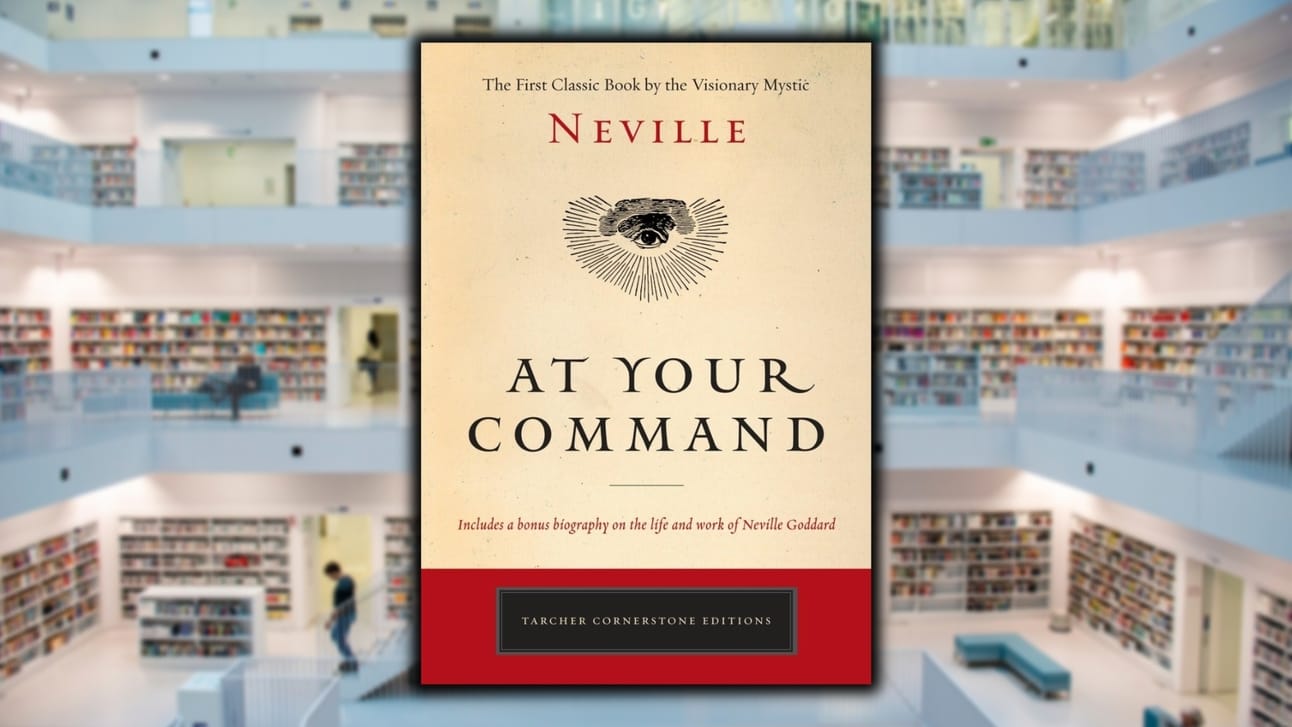These five books have virtually nothing in common except that they’re all just…excellent.
Seriously: the time I spent reading them were some of the most pleasant, exciting, thought-provoking, and beneficial hours I’ve ever spent reading, and now I get to pass them along to you!
There’s another book I’m reading right now called The Undiscovered Self, by Carl Jung, and it’s just as great as these five books. When I’ve finished it, and my notes are ready, you know I’ll be sharing them with you as well.
I’d also like to thank Nick Maggiulli for sending me an early copy of his book, The Wealth Ladder (his first book, Just Keep Buying, is a stone-cold classic of an investing book), and you’ll be hearing more about The Wealth Ladder too!
With that said, below are my complete notes and summaries from the following books…
In This Issue of The Reading Life, We’ve Also Got:
📖 What I’m Currently Reading
📕 Books I’ve Finished This Month
📜 The Book Quote of the Day
🎥 Reading a Book a Day is Easy, Actually
✍ My Latest Medium Articles
✅ New Book Releases Coming Soon
📚 Tonight’s Five Main Book Recommendations
🏅 Earn Rewards for Referring This Newsletter
Let’s not wait for our coffees to get cold…let’s hit the books!
God or Space?, by Walter Mehrer: I’m getting back to my philosophy-major roots with this thoughtful book about time, existence, space, and consciousness.
It’s a shorter, but denser read, difficult to get through in some places, but I love the author’s generally optimistic worldview and his sense of genuine wonder when confronted by the universe and its mysteries.
The Expectation Effect, by David Robson: In a very real sense, when it comes to what you experience in life and how you perceive it, “you’ll see it when you believe it.” That’s the core thrust of the book, which I’ve seen play out in my own life.
Expect people to be generous and kind, and they often will be. Expect everyone you meet to be a jerk, and you’ll run into jerks wherever you go. I’m liking the science-based reinforcement of a belief I’ve long held: that you get the kind of life you expect.
You Can Just Do Things, by Jay Yang: Jay’s been a friend of mine for years, and I’ve seen him go from a high school kid with an Instagram account, to being head of content for some of the world’s most influential creators, and now working with Alex Hormozi in Vegas. And he’s not even old enough to drink yet.
His is a book about “permissionless action,” meaning that you don’t have to - and shouldn’t - wait for someone else to “pick you.” Instead, you can just do things.
“As it happens, there are over one hundred published studies on this phenomenon, and the conclusion is crystal clear: if you explicitly state what you’re going to do, when you’re going to do it, and where you’re going to do it, you’re much more likely to actually do it.”
Reading a Book a Day is Easy, Actually: I’ve been reading a book a day (on average) for the last 7 days or so, and I firmly believe that it’s an attainable goal for nearly anyone.
It’s not just going to “happen,” but if you’re intentional about it, and you apply the three strategies I lay out in this video, you stand a much greater chance of being able to do it. Regardless of how fast you read or how much time you have. [Watch Time: 8:43]
If you enjoy the video, please consider subscribing to my channel and sharing it with a friend. Cheers!
“Status Anxiety” is the Source of Your Paralyzing Fear of Never Having Enough: And this fantastic book is the antidote (14 key takeaways).
The Business Book That Helped Me Buy My First Porsche: Ignore the scammy title - this book took me from minimum wage to financial freedom in 5 years flat.
The Saddest AND Funniest Book I’ve Ever Read is Also One of the Most Challenging Books of All Time: 39 flashes of brilliance from Infinite Jest that’ll make you think, laugh, cry - and probably all three at once.
Hard Lessons from the Hurt Business, by Ed Latimore: My friend Ed is a former heavyweight boxer too (his record is better than mine though), and his long-awaited new book is about how boxing gave him the tools to overcome childhood trauma and alcoholism. Really looking forward to this one! Expected: August 5th, 2025
Protocols, by Andrew Huberman: Andrew’s a neuroscientist and tenured professor at Stanford, not to mention hosting one of the most popular health podcasts in the world.
This book is a collection of simple, evidence-based solutions to a whole host of challenges, and a distillation of his very best advice from the podcast. Expected: September 9th, 2025
The Art of Spending Money, by Morgan Housel: This is Morgan Housel’s third book, after the 6-million-copy bestseller, The Psychology of Money, and the (in my opinion) shamefully underrated Same as Ever. I cannot WAIT for this one! Expected: October 7th, 2025
The Wealth Ladder, by Nick Maggiulli: Everyone is at a different level in their wealth-building journey, and sometimes, excellent advice for people on Level 2 won’t work for people who are on Level 5.
Nick’s book breaks down all the “levels” of wealth, and provides tailored advice for what you might want to do at each level to give yourself the best odds of succeeding financially. Expected: July 22nd, 2025
“And then, just for a few minutes or hours, my words will sound again in the mind of someone as yet unborn. Maybe.
I suppose it’s more likely that the book will lie forgotten on the shelves in some massive library storage warehouse, or perhaps it will survive only in digital form.
But, even so, to publish a book is to imagine not only its circulation across space but also its endurance through time. Every act of writing and publishing is thus an attempt to ward off death, to save something of ourselves from oblivion.”
“Books about books” are some of my favorites, and in this one, professor Tom Mole goes beyond the words on the page, past books as merely “objects,” and into what we do with them, what they say about us and for us, how we relate to them, keep them, share them, display them…just on and on.
It’s very easy to make a book like this stuffy and inaccessible, but he does a fantastic job of, well, not doing that. In that sense it’s much more conversational, easy, and free than some academic discussion of “texts” and “discourses.”
The Secret Life of Books isn’t like that at all.
If you’re the type of person who loves the feel of a physical book in your hand, who owns way more books than you could possibly count in one afternoon, and yet still feels compelled to buy more, this book was written for you.
“It is the thesis of this book that neither mastery nor satisfaction can be found in the playing of any game without giving some attention to the relatively neglected skills of the Inner Game.
This is the game that takes place in the mind of the player, and it is played against such obstacles as lapses in concentration, nervousness, self-doubt, and self-condemnation.
In short, it is played to overcome all habits of mind which inhibit excellence in performance.”
Let me just say right upfront that I have absolutely zero interest in tennis, and yet, The Inner Game of Tennis was one of the best books I’ve read all year.
The main argument of the book is that, in tennis as in life, each of us have two “selves” - Self 1 and Self 2 - that are often in conflict with each other.
Self 1 is the more critical, ego-based Self, which tends to inhibit the natural functioning of Self 2, which is our more intuitive, authentic Self. Guess which Self is better at tennis?
The parallels with Daniel Kahneman’s research, as written about in Thinking, Fast and Slow, are obvious, even though each conception is quite different.
Kahneman demonstrated how both “Systems” work in tandem, each proficient in different areas and best used for different purposes, whereas in Gallwey’s book, the insistent and overbearing Self 1 is one of the main obstacles to true happiness and athletic performance.
Truthfully, The Inner Game of Tennis brought to mind so many more connections than these as well. I see shades of Finite and Infinite Games, by James P. Carse, various works of Eastern philosophy, as well as the latest developments in sports psychology.
The Inner Game of Tennis is universally applicable, and like me, you need not have any intentions of ever stepping foot on a tennis court to get the most out of reading it.
Self 1 gets to all of us sometimes, and the softer voice of Self 2 too often gets drowned out in a flurry of self-criticism - on and off the court.
For that reason and many others, this book receives one of my highest recommendations, and I think that virtually everyone would be fascinated to find out just how deep the Inner Game goes.
“Consciousness is the resurrecting power - resurrecting that which man is conscious of being. Man is ever out-picturing that which he is conscious of being. This is the truth that makes man free, for man is always self-imprisoned or self-freed.”
Reading At Your Command was my first introduction to Neville Goddard’s work, even though I had been aware of him for several years previously, and I knew that he was something of a towering figure in the field of New Thought and practical metaphysics.
What I never expected was to be so completely enamored with this book - with his writing and speaking style, his positive, optimistic, uplifting message, and the force and power of his ideas.
The strength of his convictions comes across so powerfully in this book, and it made me want to read three or four more of his other books in quick succession, which I did.
Now, when I say “New Thought” and “practical metaphysics,” I want to make it clear that Neville Goddard came before a lot of the charlatans like Rhonda Byrne started scamming people with their “Law of Attraction” nonsense.
That’s not to say that people like her are wrong about everything, but I wanted to make clear the distinction between the two, because by all accounts Neville Goddard was just…a good person with a good heart.
His main “message” in his various books was that the human imagination is God (follow me on this one), and that the images held in consciousness are out-pictured into our external reality.
You can see the parallels between that and books like The Secret, but at the same time, if you go and ask virtually any Olympic gold medalist whether or not they saw their eventual victory in their mind, and replayed it over and over in their head until it became real, the vast majority of them are going to say yes, of course they did.
Neville Goddard just took it one step further when he said that, No, no, your imagination is literally God, and that whatsoever you are conscious of being - your awareness of being, as he called it - will manifest itself in external reality.
One of the main differences between Goddard and the snake oil salesman was that Neville himself was independently wealthy and used to give all his public talks for free. He never had anything to sell, nothing to push.
The only thing your new consciousness would cost you is your old one.
“How we spend our days is, of course, how we spend our lives.”
You can finish this book in just a few hours (it’s only about 90 pages long) and if you’re a writer, or you think you might want to be one, it will stay with you for a very long time.
That was the case for me, as I kept coming back to my notes on this book for weeks after I finished it.
The Writing Life is one of the top “advice for writers” books, right alongside Bird by Bird, On Writing (Stephen King and Charles Bukowski - different books, same title), Draft No 4, and Consider This, among others.
Dillard won a Pulitzer Prize for another book of hers, Pilgrim at Tinker Creek, and she’s been writing up a storm for decades. Novels, narrative nonfiction, essays, etc. In this book, she shares her absolute best tips and tricks.
She’s been described as a “gregarious recluse,” as she’s far more comfortable out in her cabin on the West Coast of the US than in the city, but she welcomes you right in as a fellow writer, artist, and creative, and lets you in on everything she’s been thinking about when it comes to crafting the perfect sentence, connecting to readers, seeing as a writer, dealing with the monotony of the writing life, and everything else that comes with dedicating oneself to words.
I really don’t see how, if you want to be a writer, you can’t just devote, like, a couple of hours to reading one of the best books out there on how to be a better writer.
She’ll explain the real purpose of setting a schedule and sticking to it, the differences between and advantages of several competing writing styles, how to dig deeper in your writing and come up with insights and lessons that are unavailable to those unable to sit still and wait, and how to deal with the vicissitudes of the writing life.
Even if you’re not a writer, you should still read it, if for no other reason than to see how a master craftswoman does it.
“Love and work are to people what water and sunshine are to plants.”
This is a book about finding modern truth in ancient wisdom, where professor Haidt looks at different philosophical traditions and their teachings to discover which have stood the test of time and what is now amply supported by modern psychological research.
It turns out that ancient philosophy and modern psychology have converged on some very clear answers that are so easy and effective to implement that you’ll likely be amazed at how much your life improves just by making a few simple changes.
None of these simple changes require you to become a billionaire or amass millions of followers on social media, either. You can pursue those things if you want, of course, and you might even succeed! That would be wonderful, depending on the person! But it’s only a fragile, vulnerable happiness that’s based exclusively on those things.
The Happiness Hypothesis is also where Haidt popularized the “elephant and rider” view of your emotional brain and rational brain. An elephant without a rider is out of control and chaotic, and a rider with no elephant lives without passion, energy, and drive.
Clearly, one is more powerful than the other, but in the book Haidt explores a few ways you can “tame” the elephant and educate the rider.
Forward this to a friend you think would love these books!
If you were sent this newsletter, click here to subscribe.
To read past editions of The Reading Life, click here.
Click here to recommend The Reading Life on Twitter (X).
OK, that’s it for now…
I’ve got plenty more excellent book recommendations coming your way soon though!
And if you want to learn how I’ve built an audience of 160,000+ followers across social media, became a full-time creator, and how I’m rapidly growing my audience and my profits in 2025, join us inside Creator Launch Academy and that’s exactly what I’ll teach you — we’d love to have you in the community!
With that said, I hope you enjoyed this edition of The Reading Life, and enjoy the rest of your day!
Until next time…happy reading!
All the best,
Matt Karamazov
P.S. Whenever you're ready, here are two more ways I can help you:
Content Creators: Book a 1:1 call and I’ll help you hit $5K/month with a plan tailored to your business.
Join Creator Launch Academy, my mastermind for educational content creators building real revenue and real freedom.




























